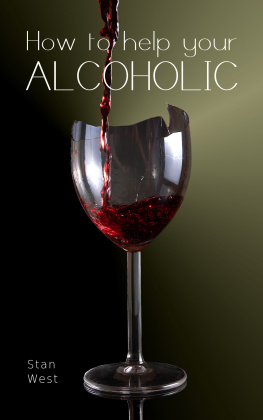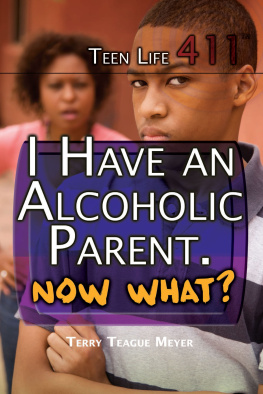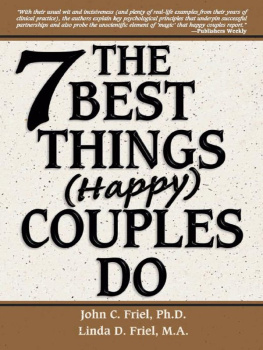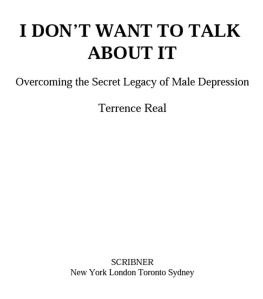Adult
CHILDREN
The Secrets of
Dysfunctional Families
John C. Friel & Linda D. Friel

Health Communications, Inc.
Deerfield Beach, Florida
www.hcibooks.com
Library of Congress Cataloging-in-Publication Data
Friel, John C., 1947
Adult children.
1. Adult children of alcoholics. 2. Adult children of narcotic addicts.
3. Problem families. I. Title. II. Title: Dysfunctional families.
HV5132.F75 1988 362.2'92 87-25037
eISBN-13: 978-07573-9335-8
eISBN-10: 0-7573-9335-7
1988, 2010 John and Linda Friel
All rights reserved. Printed in the United States of America. No part of this publication may be reproduced, stored in a retrieval system or transmitted in any form or by any means, electronic, mechanical, photocopying, recording, or otherwise, without the written permission of the publisher.
HCI, its logos, and marks are trademarks of Health Communications, Inc.
Publisher: Health Communications, Inc.
3201 S.W. 15th Street
Deerfield Beach, FL 33442-8190
Cover design by Justin Rotkowitz
Interior formatting by Dawn Von Strolley Grove
Dedication
This book is dedicated to our family system. To our parents, Elden and Alice Friel and Lloyd and Phyllis Olund; to our brothers and sisters, Bill and Nancy McIntyre, Rich Friel, Steve and Margo Bateson; and to our nieces and nephews, Brian and Carrie McIntyre, John Michael, Mark and Mary Friel. And especially to our children, Kristin, Rebecca and David that their lives may be full and warm and true.
Acknowledgments
We would like to thank all the friends, mentors and colleagues who have shared in and contributed to our professional development and personal recovery: Terry Kellogg, Robert Subby, Lawrence Murphy, Robert Milligan, Lawrence and Sandra Weiss, John Nesselroade, John Cone, Charlie Olsen, Walt Ayotte, Bill Byxbee, Richard and Maureen Gevirtz, Diane Naas, Suzanne James, James Maddock, John Nolan, Richard V. Anderson, Arlene Katchmark, Mary Pietrini, Mary Bell, Lynn Brennan, Lynda Winter, Stan Huff, Evelyn Leite, Linda Murdock, Ken Adams, Bruce Smoller, Virginia Leone and Chuck Ellwanger.
Special Thanks
Special thanks to Arlene Katchmark for her tireless contribution to the preparation of this manuscript.
About The Authors
John C. Friel, Ph.D., is a psychologist in private practice in St. Paul, Minnesota; Director of the St. Paul/Minneapolis Lifeworks Clinic, an intensive, short-term treatment program for Adult Child, Co-dependency, addiction and compulsivity issues; and adjunct Associate Professor of Psychology at St. Marys College Graduate Center in Minneapolis. Dr. Friel earned his B.A. in psychology from the University of San Francisco in 1969, and his Ph.D. in psychology from West Virginia University in 1976. He is a nationally recognized author, trainer, speaker and consultant in the areas of dysfunctional family systems, co-dependency, adult child issues, stress and addictions; and has worked in these areas with the University of Minnesota Medical School, the Gillette Company, Graco Corporation, NCR/Comten, the Minnesota State Bar Association and numerous other corporations, state agencies, treatment centers, hospitals and small businesses. A native of Marin County, California, Dr. Friel has lived in Minnesota since 1973.
Linda D. Friel, M.A., C.C.D.P., specializes in therapy for Adult Children, Co-dependency issues and for Survivors of Physical, Sexual and Emotional Abuse. She designed and implemented one of the first hospital-based co-dependency treatment programs in the United States, and is also a nationally recognized author, trainer and consultant in the areas of dysfunctional families, co-dependency, adult child issues and addictions. A native of Minneapolis, Linda earned her B.A. from Mankato State University in 1971, taught special education classes for eight years and earned an M.A. in Counseling and Psychological Services from St. Marys College in Minnesota in 1980.
Preface
The examples and case studies used throughout this book are composites of individuals and families with whom we have worked over the years. The details and specifics of the cases, such as geographical location, job descriptions and names, have been changed for purposes of anonymity. In all other respects these are very typical cases of Adult Children.
Throughout this book we have tried to use case examples that typify different symptoms and addictions so that the reader can get a feel for the variety of dysfunctional lifestyles that develop in Adult Children. By no means have we been able to exemplify in the case studies all of the possible dysfunctional lifestyles and symptoms that can occur. In truth, there are as many case examples as there are people.
As we try to stress throughout this book, recovery is not something that can be done alone; and in many cases, it cannot be done without professional help. A book such as this is written to provide what we feel can be helpful information as part of a much more comprehensive program of recovery.
We must note that self-help books can become an addiction in and of themselves, and that at some point we must get on with the painful business of actually living our lives differently, rather than just thinking or learning about how that might be.
Finally, we cannot stress enough that this book is for you. It is not for your husband, wife, lover, children, boss or employees. One of our definitions of co-dependency is The-Chase-Your-Spouse-Around-The-House-With-A-Self-Help-Book Syndrome. Recovery from Adult Child issues is a personal experience. The most powerful way to help others into their own recovery is to simply live your own life of recovery. Your own recovery will be well under way when you truly trust that your own example is the most powerful way to help others.
John C. Friel, Ph.D.
Linda D. Friel, M.A., C.C.D.P.
Contents
Part I
Adult Children
Its inhabitants are, as the man once said, Whores, pimps,gamblers and sons of bitches, by which he meant everybody.Had the man looked through another peephole he might havesaid, Saints and angels and martyrs and holy men, and hewould have meant the same thing.
fromCannery Row
by John Steinbeck
1
Introduction
In July of 1985 thousands of people from all over the world descended on Montreal, Canada, to celebrate the 50th anniversary of perhaps the most successful worldwide organization in existence. This organization, which has no formal leadership and no political affiliations of any kind, was founded by two failures, and has grown to become the most successful group of its kind in history. It does not accept outside financial support from any foundations or corporations, and it never has. Yet it has a membership of millions of people in over 135 countries. It does no formal promotion of any kind. It does not have marketing personnel. It does not allow its members to use its name for personal promotion of any kind.
In fact, all of its members must remain anonymous, for all practical purposes. According to one of this organizations statements on this issue, Our public relations policy is based on attraction rather than promotion; we need always maintain personal anonymity at the level of press, radio and films. Anonymity is the spiritual foundation of all our traditions, ever reminding us to place principles before personalities. This successful worldwide organization, as you may have guessed, is Alcoholics Anonymous.
The history of A.A. is a fascinating study for anyone interested in successful social movements or organizations, regardless of whether or not one buys the A.A. philosophy. Despite the tremendously rapid cultural changes that we have experienced since 1935, A.A. has managed to survive and grow. It has weathered the good times of the 50s; the upheaval of the 60s; the sexual revolution of the 70s and the new me generation of the 80s. In fact, like cancer-fighting cells in the human body, it is starting to spread even more, and it is changing shape as well.
Next page







